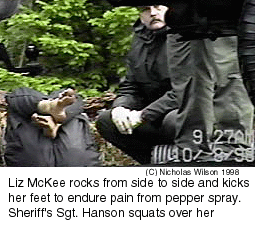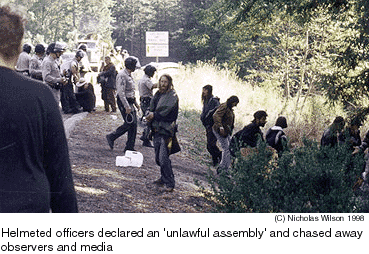
Confrontation at Grizzly Creek (IV)
 |
|
|

 Littletree and McKee both said that the officers' next tactic was threatening to use pepper spray on "Kermit," the man locked next to McKee. They were told that Kermit was an asthma sufferer, and that pepper spray could kill him. McKee said the officers tried psychological coercion on her by telling her it was her fault if Kermit was pepper sprayed because she refused to unlock. When she still refused, the officers relented, and began to use tools to try to cut her free. After supporters saw that officers had quit using pepper spray, the protesters in the highway voluntarily withdrew to the roadside, feeling their action had succeeded. At an impromptu press conference nearby, while officers continued to work at cutting activists loose, Lt. Greg Busey denied that pepper spray had been applied three times to McKee. He said he ordered pepper spray used on her because it had been successful yesterday in getting two women to unlock from logging equipment on the ridgetop. When it didn't seem to work on McKee, they quit using it and gave her first aid. When asked if the protesters taking a position in the highway caused him to decide not to use pepper spray on the others, Busey replied, "I would have to say yes." He said he faced a choice of declaring an unlawful assembly and forcing everyone to leave the scene or trying something else. When officers discovered the activists had used nylon rope or webbing instead of chains inside the lockboxes, Busey decided to try cutting them loose. He refused requests from media to approach and photograph the action where officers continued working to cut the activists loose. There were cameras from three television stations as well as photographers from several newspapers. Busey claimed the exclusion was for the reporters' safety. Deputies succeeded in breaking the lockdown chain by cutting loose one man and one woman near the middle. They reached into the lockdown sleeves with wire hooks and scalpels and cut the webbing securing the protesters' wrists inside. With the chain broken, they then moved the remaining activists to the sides of the logging road, and Pacific Lumber equipment rolled in to clear away the barrier and repair the steep dirt road to the ridgetop.
 Three civil rights observers sat down, refused to disperse and were arrested. They vowed to make it a test case challenging the use of the unlawful assembly statute under the circumstances. Bonnie Blackberry, Robie Tenario, and Jane Lapiner, said they have no connection to Earth First! and were present only to observe. They were booked for unlawful assembly and failure to disperse, then jailed until they could post $5000 bond each. Blackberry, a Garberville area resident active with the Civil Liberties Monitoring Project, told the Monitor the three will definitely use a constitutional defense to the criminal charges, though she expects charges will be dropped. She said they will certainly sue the county in federal court. In fact, Blackberry is the coordinator for an already existing federal lawsuit on behalf of activists and observers arrested November 15, 1996 while attempting to disperse after a similar order at nearby Carlotta. By 4:30 deputies still had no further success in cutting the activists free, and eventually made a deal to cite and release the remaining seven, including McKee, rather than jailing them, if they would voluntarily unlock. The nine who locked down were charged with conspiracy, trespassing, and resisting arrest. One woman who had crossed the highway to protest the pepper spray use was arrested for interfering with an officer. There were 13 arrests in all for the day. The lockdown had lasted 11-1/2 hours and prevented Pacific Lumber from resuming logging one more day on the steep ridge where David "Gypsy" Chain died. A week after being pepper-sprayed, McKee said she had seen two doctors and had felt recurring pain for a couple of days after the event whenever she cried or got water in her eyes. But she said she felt okay. Asked how she found the strength to bear the pain and refuse to unlock, she said "I knew that people had been through it before, and I knew that if I unlocked, the sheriff would think this was a good way to get people to stop doing these lockdowns. So I felt it was in my and the movements's best interest if I could kind of ride the pain out. I knew it was only temporary." 

Albion Monitor October 16, 1998 (http://www.monitor.net/monitor)
All Rights Reserved.
Contact rights@monitor.net for permission to use in any format.
|